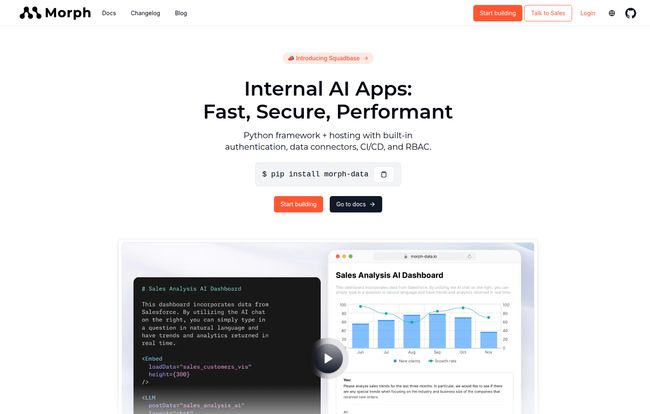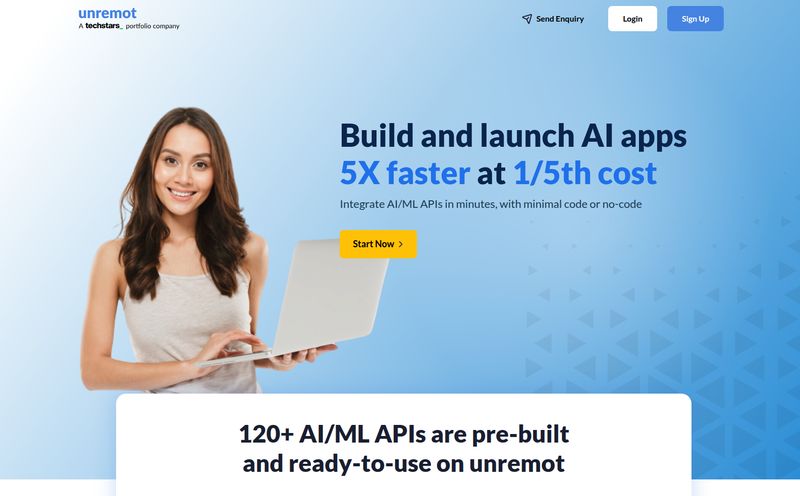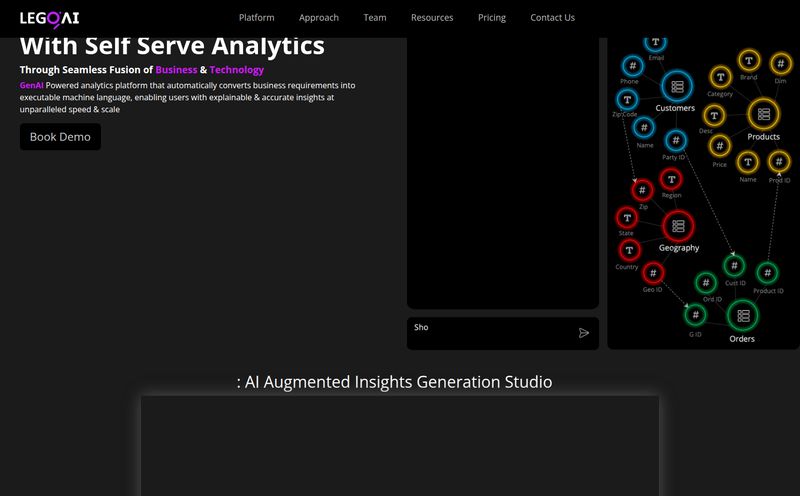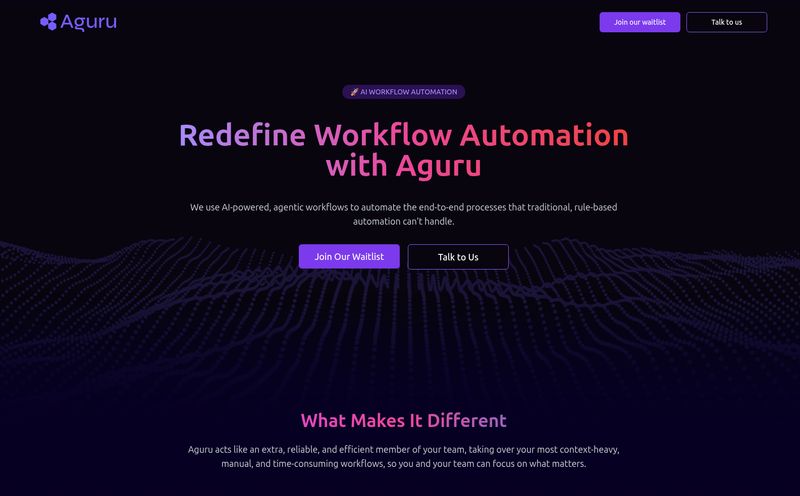If you've ever worked in a company with more than ten people, you've felt the pain. The pain of needing a simple internal dashboard, a little app to track inventory, or a tool to visualize some sales data, and being told it's a six-month wait in the dev queue. You end up wrestling with a Frankenstein's monster of Google Sheets and Zapier automations. We've all been there.
So when a tool comes along that claims you can build and deploy secure, performant internal AI apps in minutes, not weeks, my inner skeptic raises an eyebrow. But my inner, overworked-and-under-resourced professional leans in a little closer. The tool in question is Morph, and I've been digging into what it's all about.

Visit Morph
So, What Exactly is Morph?
At its heart, Morph is a platform designed to dramatically speed up the creation of internal applications. Think custom dashboards, data analysis tools, simple CRMs—all those little things a business needs to run smoothly but that never get prioritized. It’s built on a foundation of Python and Markdown, which is music to my ears. No clunky drag-and-drop interface that limits you at every turn. Instead, it gives you the power of a real programming language in a ridiculously streamlined environment.
The whole idea is to provide a secure, server-based environment where you can connect your data, write some simple code, and have a functional, shareable app. It's not just a front-end builder; it handles the deployment, security, and permissions, which is often the most tedious part of the whole process.
Who Is This Really For?
I've seen a lot of platforms like this, and they often try to be everything to everyone. Morph seems a bit more focused, which I appreciate. Here's who I think will get the most out of it.
The Scrappy Data Team or Solo Dev
If you're a small data team or a developer tasked with supporting other departments, Morph feels like a secret weapon. You can quickly spin up an interactive dashboard for the marketing team using their live data from PostgreSQL or BigQuery. The promise of launching their Python framework in one minute (literally `pip install morph-data`) is a bold claim, but even if it's 10 minutes, that's a massive win. You get to be the hero without spending a month configuring servers.
Growing Businesses Needing Control
As a company grows, so does the need for proper access control. You can't just have everyone looking at everything. Morph's pro plan introduces role-based permissions and team collaboration features. You can build an app and ensure that only the sales managers see the sensitive commission data, while the reps only see their own numbers. This is the kind of grown-up feature that's often missing from other “quick build” tools.
The Standout Features
Okay, let's get into the nitty-gritty. What actually makes Morph compelling? A few things jumped out at me from their feature list.
Connecting to... Pretty Much Everything
An internal tool is useless if it can't get to your data. Morph seems to get this, and supports a solid list of data sources out of the box. We're talking:
- Databases like PostgreSQL and MySQL
- Data warehouses like Snowflake and BigQuery
- SaaS platforms like Salesforce and Intercom
- Project management tools like Linear
This flexibility means you can pull data from multiple places to create a single source of truth, which is the holy grail for most internal dashboards.
Self-Hosting and Local LLM Deployment
This is a big one for anyone concerned about data privacy and security. The Pro plan allows for self-hosted LLM deployment. You can even run it locally with Ollama. This means your sensitive company data isn't being sent off to a third-party API for processing. For industries like finance or healthcare, this isn't just a nice-to-have; it's a requirement. It also gives you more control over costs and performance, which is always a plus.
Build and Deploy Straight from GitHub
I love this. The integration with GitHub means you can follow proper development workflows. Your app's code lives in a repository, you can track changes, collaborate, and automatically deploy updates. It treats your internal tools like the serious software they are, rather than some one-off script living on someone's laptop. Its a simple feature, but it speaks volumes about the platform's philosophy.
Let's Talk Money: The Morph Pricing Tiers
Pricing can make or break a tool like this. You need a low barrier to entry for people to try it out, but a clear path to scale. Morph's pricing seems... surprisingly fair. They've split it into two main tiers.
| Feature | Free Plan ($0/month) | Pro Plan ($15/user/month) |
|---|---|---|
| Users & Projects | 1 user, 5 projects | Unlimited users & projects |
| Collaboration | 5 total viewers | Unlimited (Devs at $15/seat, Viewers at $7/seat) |
| Role-Based Access | No | Yes |
| Self-Hosting LLM | No | Yes (including Ollama) |
| Log Retention | 7 days | 30 days |
The Generous Free Plan
Honestly, the free tier is incredibly generous. Five projects and five viewers is more than enough to build something genuinely useful and prove its value. You get the GitHub integration and a decent amount of serverless compute credits. It’s a perfect, no-risk way to kick the tires.
Scaling with the Pro Plan
The Pro plan is where it gets serious. For $15 per user per month (with viewers being cheaper at $7), you unlock all the collaboration and security features. This is the plan for teams. The ability to have unlimited projects, proper member roles, and self-hosted LLMs justifies the price point, which is very competitive compared to other players in the space.
My Final Take on Morph
So, is Morph the magic bullet for internal tool development? Maybe. It’s definitely a powerful contender. I appreciate that it doesn't try to hide the code. It embraces it, giving developers the tools they know and love (Python, Git) in a package that strips away the most annoying parts of the job—deployment and security configuration.
Of course, no tool is perfect. The focus is clearly on Python, so if your team is built on R or Javascript, this might not be the right fit. And like any new platform, there's always a learning curve. But from what I've seen, Morph has a clear vision and is solving a real, nagging problem for a lot of companies. It strikes a fantastic balance between speed and power, and that's a tough thing to get right.
Frequently Asked Questions about Morph
- What kind of apps can I build with Morph?
- You can build a wide range of internal tools, from data dashboards and admin panels to simple CRMs and AI-powered chatbots that connect to your company's knowledge base.
- Do I need to be an expert programmer to use Morph?
- You'll need a working knowledge of Python to get the most out of it. It's not a no-code platform. However, it simplifies the development process so much that an intermediate Python user can be incredibly productive.
- Is the free plan really free?
- Yes, the free plan is $0 per month. It comes with limitations on users, projects, and some advanced features, but it's fully functional for small-scale use and for testing the platform's capabilities.
- How does the self-hosted LLM feature work?
- The Pro plan allows you to deploy and run Large Language Models (like those available through Ollama) on your own infrastructure or local machine. This ensures your data remains within your control, which is crucial for security and compliance.
- Can I connect Morph to a custom API?
- Since you are building with Python, you can use popular libraries like `requests` to connect to virtually any REST API, even if it's not a pre-built integration. This gives you almost limitless flexibility.
Conclusion
At the end of the day, the bottleneck for internal tools is rarely about ideas; it's about execution and resources. A platform like Morph directly attacks that problem. It empowers the people who understand the data—the developers and analysts—to build the solutions the business needs, fast. If you're tired of waiting in the dev queue or fighting with spreadsheets, I'd say giving Morph's free plan a spin is a no-brainer. It might just be the productivity boost your team has been looking for.
Reference and Sources
- Morph Official Website: (A placeholder link to morph.com or its actual URL would go here)
- Ollama for Local LLMs: https://ollama.com/



